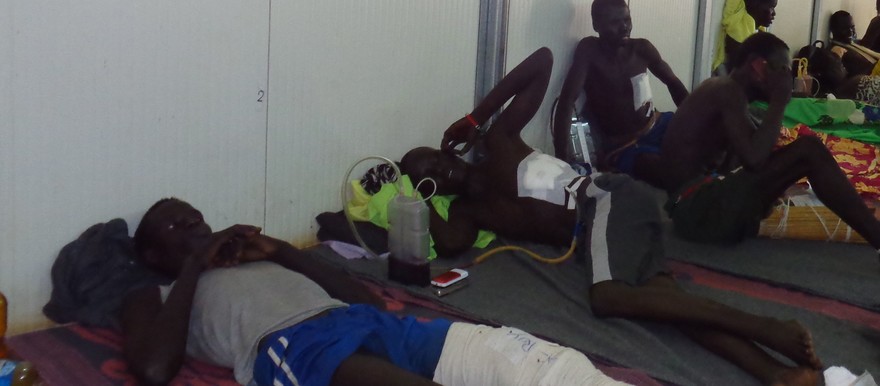South Sudanese commanders have launched an initiative to build a new medical ward at the military hospital at Giyada in Juba. The initiative comes at the behest of generals who were ‘shocked’ by the conditions for wounded soldiers.
Brigadier General Majier Deng Kur is one of the officers behind the idea of building the new military ward through individual contributions. In an interview, he explains how the initiative started.
What motivated you to come up with this initiative?
Brig Gen. Majier: The idea of building the ward came when I and other colleagues accompanied the deputy chief of general staff for administration, who is also the overall commander for operations in Jonglei, Lieutenant General Malual Ayom, during a visit to the military hospital in Giyada.
The aim was to acquaint himself with the general situation of the hospital and our wounded soldiers, and to congratulate them for defending the constitution and the elected government and to assure them that their government would always take care of them.
It was during this visit that we felt the situation for our wounded soldiers required immediate attention. We therefore decided right away to ask for immediate individual contributions because what we saw was shocking.
Indeed it was very upsetting to see fellow colleagues and comrades being admitted in tents that are exposed to tetanus infections. We saw this was more risky to their lives than the wounds they sustained in fighting. This situation moved me to talk to officers and workers under my command, requesting them to making contributions.
How much was required from each individual?
Brig Gen. Majier: It was not a compulsory contribution. It was voluntary based on will. So we accepted whatever someone could pay. We accepted anything useful in the construction. We accept sand; we accept timbers, we accepted cement, we accepted iron bars, we accepted building materials and anything that could be used in the construction. We did not put specific amount of money but some colleagues and comrades came out with suggestion that each officer contributes 1000 SSP and non-commissioner officer contributes 200 South Sudanese pounds. This contribution went on for three months until we managed to raise 600,000 SSP.
Did you receive contributions from other people within the military leadership?
Brig Gen. Majier: Oh yes. We did receive a helping hand from our Minister of Defense, General Kuol Manyang Juuk, without whom our initiative would not have been successful because he was one of the first people to bring his contribution.
He availed some money to hire some trucks to bring the building materials from Kenya and Uganda. He actually played a key role in the project and I can tell you his direct involvement was a big boost and significantly contributed to the eventual success.
Also the Chief of General Staff, General Paul Malong Awan, was instrumental and I must thank him and Major General Kiir Garang Kuek for contribution they made in ensuring that there was always some water at the construction site. Water trucks and water tanks were always ready and available during the work. They helped in bringing water and sand.
How about civilians, did you receive some help?
Brig Gen. Majier: Indeed we received a helping hand from Makiir Gai, a nationalist businessman, who contributed 100,000 South Sudan pounds. According to him, the campaign is continuing and has now been extended to the general public because they are planning to build three more wards because the current capacity of the hospital requires more wards.
We are counting on everybody. Whatever you can, we accept. Building a nation is a collective journey and it must involve everybody. We need to renovate and expand the hospital because it is overstretched beyond its initial capacity. It was meant for 100 people but now it is four times than that.
File photo: Wounded fighters at a UN base in Juba, Jan. 2014 (Radio Tamazuj)
Related coverage:
South Sudan’s military casualties top 20,000 (23 Nov.)
South Sudan’s wounded not registered with disabled commission (21 Nov.)
‘Scandal’ of silence on S Sudan war victims (17 Nov.)
Opinion: Disability is not inability (17 Nov.)
Opinion: Educate the disabled in South Sudan (17 Nov.)
Heavy casualties in recent battle for Bentiu (2 Nov.)
Wounded in War: injured soldier struggles to pay for treatment (26 July)
Rumbek Hospital struggles to cope with SPLA wounded (29 Apr.)
Upper Nile: 43 wounded fighters arrive in Melut (6 March)
Medical sources say about 750 wounded in Upper Nile region fighting (25 Feb.)




